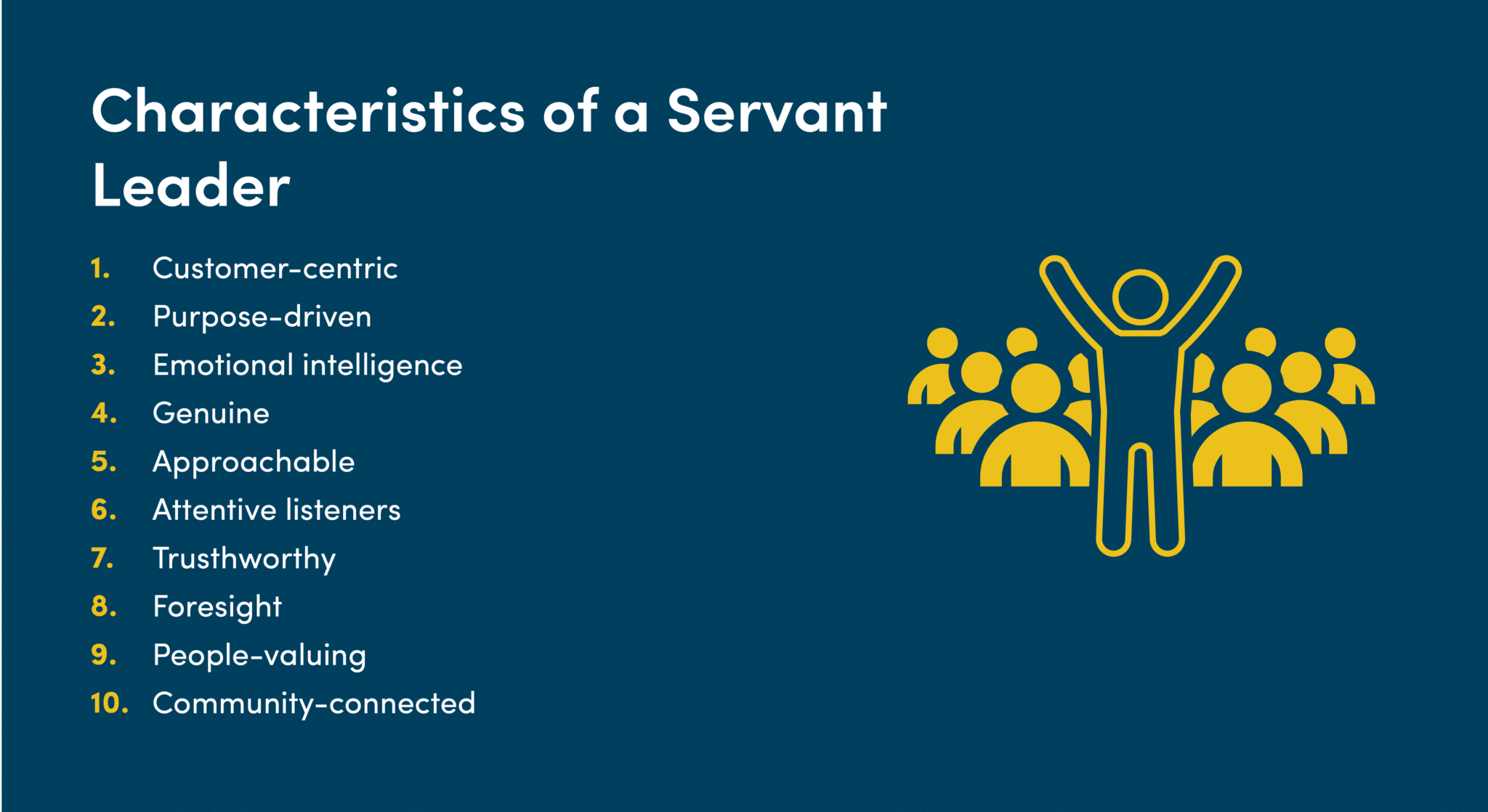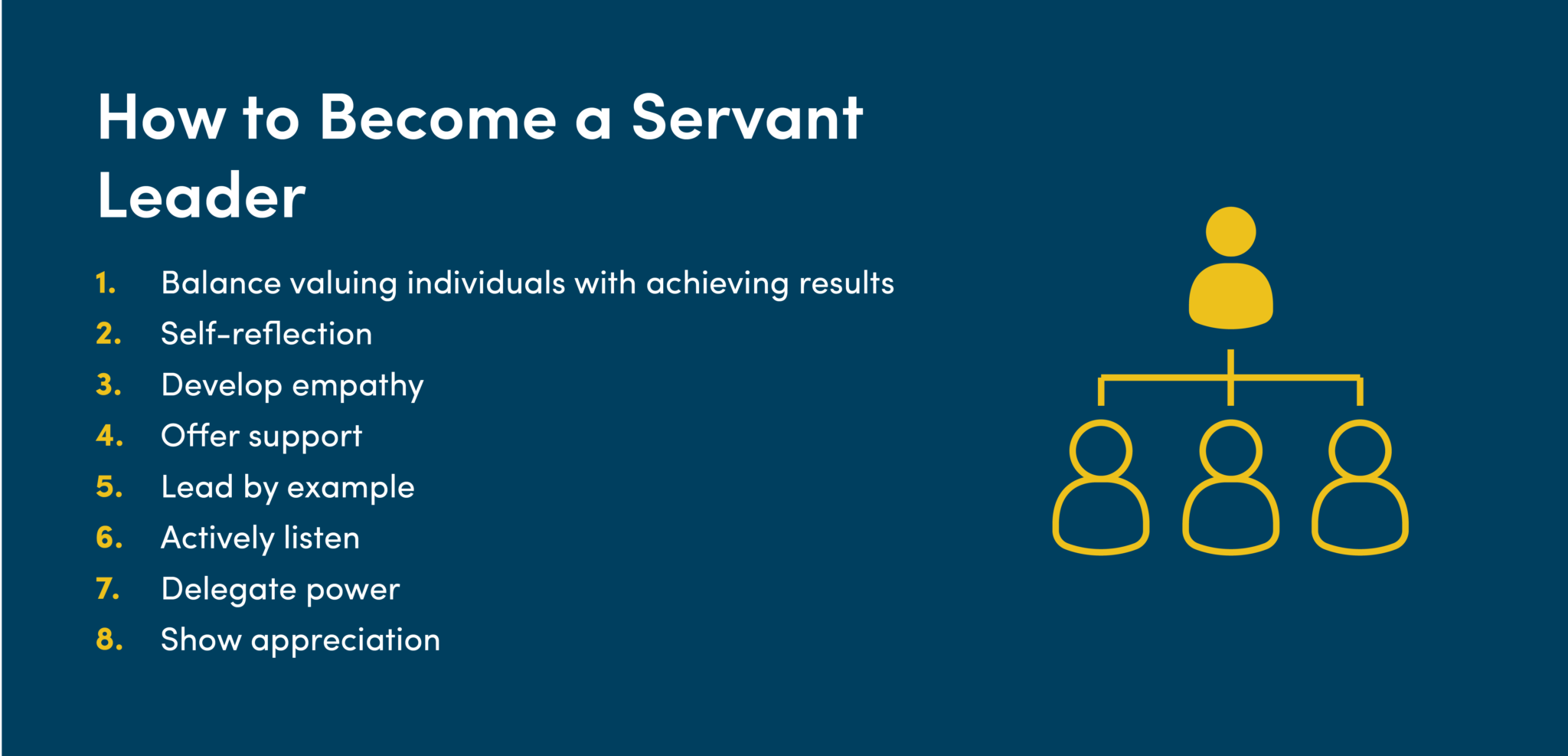What Are the Characteristics of a Servant Leader?

Servant leadership is a philosophy that focuses on serving others to meet their needs. In turn, those on the receiving end feel empowered to achieve their full potential. Overall, this approach emphasizes empathy, humility, and selflessness, with the leader acting as a servant to their team.
But what are the qualities of a servant leader, and if you don’t hold these qualities, can you become a servant leader? In this guide, we’ll walk through all you need to know about the characteristics of a servant leader, how to become one, and more. This way, you can serve your team and enable them to succeed and thrive.
- Customer-centric
- Purpose-driven
- Emotional intelligence
- Genuine
- Approachable
- Attentive listeners
- Trustworthy
- Foresight
- People-valuing
- Community-connected
- Servant Leadership Example
- How to Become a Servant Leader
- Wrapping Up: Qualities of a Servant Leader
What Is Servant Leadership?
There are various CEO leadership styles, from democratic leaders to transactional leaders. One of the most effective types of leaders is servant leaders. Servant leaders have the confidence to build something more formidable than their own careers and are able to put purpose over profit. They help their customers succeed and keep all their stakeholders top of mind. It takes work to break some of the patterns that propelled many of these executives into leadership positions, and that work has allowed these leaders to live by their values and find a greater purpose in their journey.
In fact, there are several positive effects of servant leadership. In a study, it was found that servant leadership led to a 6% increase in job performance, an 8% improvement in customer service, and a 50% boost in employee retention.
 These respected and effective CEOs, these “servant leaders,” adopt a global view of what it means to lead. Many have successful marriages and happy, healthy children. They volunteer. They act with intentionality. And they inspire others to do the same.
These respected and effective CEOs, these “servant leaders,” adopt a global view of what it means to lead. Many have successful marriages and happy, healthy children. They volunteer. They act with intentionality. And they inspire others to do the same.
What Are the Qualities of a Servant Leader?
So, what are the qualities of a servant leader? Each type of leader has their own distinct leadership qualities. I’ve been in a room filled with servant leader types. While they all have their own unique personalities, perspectives, and business approaches, there is a clear pattern of shared characteristics they display. Here are ten typical characteristics of a servant leader.

1. Customer-centric
Executives who embody the values of a servant leader look at their companies through the lens of their customers and ask, “How can I enrich their lives?” Because the key defining qualities of a servant leader are to serve, this quality extends beyond their internal team to external stakeholders and customers. A servant leader aims to meet the needs and expectations of their customers, prioritizing their satisfaction to deliver valuable products or services. In turn, they help to create a relationship built on trust and loyalty that keeps customers coming back for more.
2. Purpose-driven
These leaders ask how their actions can serve humanity and not just the bottom line. This approach does not discount the importance of profit, but it puts profit in the context of a more holistic view of what the company can accomplish.
With a deep sense of purpose, servant leaders have a clear direction, motivation, and unifying goal for their entire team. Because their guiding principle is focused on their purpose, they can rally their team to work toward a common objective. They connect the daily tasks and activities to the larger mission, making it easy for their employees to see the impact of their work. Purpose is one of the most important traits of business leaders, as it allows them to not only have a clear vision but attract like-minded individuals to their organization to create a positive work culture.
3. Emotional intelligence
One of the most evident qualities of servant leaders is emotional intelligence, as it enables them to understand, interpret, and respond effectively to the emotions of not only themselves but others around them. Emotional intelligence plays an integral role in how servant leaders lead. For example, with the ability to show empathy, servant leaders can connect with the feelings and perspectives of their team members to understand their concerns and create a compassionate workplace. Servant leaders’ strong social skills also make it easy for them to navigate social complexities, foster positive relationships, and build rapport to resolve conflicts, collaborate, and communicate.
4. Genuine
Servant leaders show their true selves to others. They are transparent and open. They are adept at discovering and discussing other people’s strengths and weaknesses because they have already become aware of their own positive attributes and faults.
What makes this a great characteristic of servant leaders is that being genuine allows them to inspire their team through example. Their authenticity encourages others to be their best selves, which makes it comfortable for the leader and their team to admit mistakes, learn from them, and forge deeper connections with one another.
5. Approachable
Humility is what makes the servant leader approachable. It’s the difference between the executive leader that employees want to avoid in the hallways, and the leader who makes team members feel comfortable and at ease. The humility of servant leaders creates an environment that’s open and inclusive and makes people feel comfortable to share their thoughts, ideas, and concerns.
As one of the top servant leadership strengths, approachability makes it easy to have strategic conversations, as it eliminates hierarchical barriers that typically make employees fear judgment or retribution. Instead, servant leaders put their employees at ease so they can approach their leader with trust and an open mind. This openness leads to faster problem-solving, improved collaboration, and a healthier work environment.
6. Attentive listeners
Most people don’t listen as well as they think they do. Servant leaders surpass average active listening—they are deep listeners. And because they really take in what others say, they are able to ask illuminating questions and provide intelligent and strategic guidance for a business leader.
A reason why listening is a crucial characteristic of servant leaders is because it helps to promote innovation in the workplace. Employees sometimes come up with better ideas than the boss. Executives who actively listen to diverse ideas are able to adopt a growth mindset that puts egos aside and allows others’ perspectives and ideas to flourish. In turn, they’re able to gather valuable insights from their team that lead to creative problem-solving and innovative solutions.
7. Trustworthy
Trust is one of the defining qualities of servant leaders. A servant leader is a confidant. These leaders act as sounding boards for important decisions. Because servant leaders are natural encouragers and want the best for others, people turn to them over and over again. Trust helps build a foundation of meaningful relationships where team members are more likely to express their challenges, ideas, and concerns. It encourages vulnerability by letting others know it’s okay to admit mistakes and ask for help, as well as boosting employee morale, which leads to increased job satisfaction. Servant leaders give their team the peace of mind that they’re working in a safe and collaborative environment that promotes risk-taking and effective communication.
8. Foresight
Knee-jerk decisions in reaction to immediate pressures are not the way of the servant leader. Instead, these leaders rise above the short-term noise and cultivate value according to a long-term vision. This key servant leadership strength helps to deliver a long-term impact that focuses on the core initiatives of the organization. By investing in projects that align with long-term objectives, servant leaders help to contribute to the betterment of their company and society as a whole.
With the foresight to envision where they want to end in the future, servant leaders inspire confidence, giving their team members and stakeholders a clear vision of what the future holds and how to work toward shared goals to get there. Strategic planning is also a great servant leadership strength that makes it easy for these individuals to lead their teams by anticipating market demands, trends, and future needs to ensure they’re on a path heading in the right direction. Foresight allows servant leaders to flex their decision-making skills and showcase how they can show compassion while still keeping their organization’s best interests in mind.
9. People-valuing
People-valuing is another defining characteristic of servant leaders. Servant leaders have genuine care and concern for people. They are dedicated to the personal and professional growth of the people they lead and they value individuals for who they are, not just for what they’ve accomplished.
When employees have the comfort of knowing their leader genuinely cares for and respects them, they have a heightened sense of security and comfort that contributes to their overall well-being and work satisfaction. In turn, increased job satisfaction leads to positive outcomes for the organization, such as increased productivity, customer service, and innovation.
10. Community-connected
Because this leader values people, they make the effort to form bonds and grow their social networks. They engage with the community on and offline and are recognized as positive influencers. Since servant leaders are community-connected, they can form strategic bonds with those in their community and industry, making it possible to create partnerships that benefit both sides. Servant leaders know they can’t go at it alone, and having a community to rely on is one of the best ways to succeed. There are countless ways servant leaders connect with their communities, from charity events to fundraisers, galas, trade shows, webinars, and more.
Servant Leadership Example
When fire season forced last-minute closures of many of California schools, employees of school lunch company Choicelunch took it upon themselves to donate 5,000 meals to first responders on the front lines.
These employees didn’t call CEO Justin Gagnon or his partners. They didn’t ask permission or create a mile-long email chain to discuss whether to donate the food. They acted, knowing that it was the right thing to do and that their leadership would support them.
“That was one of my proudest moments,” Gagnon said. “I was in awe.”
Gagnon and his partners had cultivated a company culture of action and ownership that was reflected back to them that day. On his company’s blog, Gagnon wrote how grateful he is to work with “problem solvers wired to do good in the world.” When CEOs make the mission and vision of their companies clear to employees, and enable them to make decisions in alignment with the company purpose, stellar results like this one ensue.
How to Become a Servant Leader
There are many strengths of servant leaders that make them effective in their roles. With that said, you may be wondering how to become a servant leader. If you want to embody the characteristics of a servant leader, implement these tips into your day-to-day:

- Balance valuing individuals with achieving results: Research shows that leaders who primarily focus on just one or the other are not viewed as strong leaders. Leaders who are positive and motivational toward employees, in addition to being strategic about business goals, make the winning combination that produces great leadership.
- Self-reflection: To become a servant leader, you need to sit down with yourself and reflect on your personal characteristics, values, and goals. Servant leaders have strong emotional intelligence, which makes it easy for them to identify both areas for improvement and their personal strengths and how to build upon them. With that said, you need to learn how to do the same, and taking time to reflect on your strengths and weaknesses can get you there.
- Develop empathy: Another way to embody the characteristics of servant leaders is by putting yourself in others’ shoes. Through active listening and trying to understand the emotions and concerns of those around you, you can broaden your perspective on different situations and learn how to better serve your team.
- Offer support: This approach will leave behind the boss-gives-orders mentality and cultivate the leader who provides vision, direction, and resources.
- Lead by example: To showcase the qualities of a servant leader, demonstrate the values and behaviors you expect from those on your team. Modeling these qualities can help guide your actions and decisions to become a stronger leader.
- Actively listen: As stated, active listening is one of the top servant leadership strengths. Engaging in deep, thought-provoking conversations and showing genuine interest instills a sense of trust and respect in those you engage with. Validate their opinions and feelings, and make sure your responses are meaningful and intentional.
- Delegate power: The best leaders give their power away. In doing so, they earn respect from those who follow them. True power is the ability to empower others to lead and flourish in their own capabilities.
- Show appreciation: Do you express appreciation for employees by thanking them for something specific they did? Do you have an employee recognition program? If so, does that program reward only revenue winners, or does it spotlight employees who have exhibited extraordinary teamwork, integrity, or kindness in the workplace?
These are some of the tips on how to become a servant leader. If you think you have what it takes to serve those around you, you may also consider becoming an executive coach. Servant leaders make great executive coaches, as they have the emotional intelligence and people skills to help others succeed. Use these strengths to your advantage to help other leaders in your position.
Wrapping Up: Qualities of a Servant Leader
There are several defining characteristics of servant leaders that highlight why they make effective heads of organizations. If you embody the qualities of servant leaders, use them to uplift your team and those around you. For more inspiration, read through encouraging servant leadership quotes that can inspire your success.
As a Vistage Chair and executive coach, I am continually impressed and inspired by the leadership growth and improved effectiveness of my Vistage group members. While I see a common thread of purpose-driven service coupled with business outcomes focus, I also admire their integrity and engagement with their families, communities, and personal health and well-being. I believe taking care of their personal lives fuels their capacity to give generously at work.
Working with our Vistage members in a holistic way makes being an executive coach the most fulfilling profession of my life. These executives embody a generosity of spirit and growth-oriented intention, propelling good companies to greatness and helping their employees evolve into leaders themselves. This is the essence of servant leadership. There are countless benefits of peer advisory groups that connect you with other leaders who offer fresh perspectives and new ideas. Explore our executive coaching programs and peer advisory groups today to get started.

